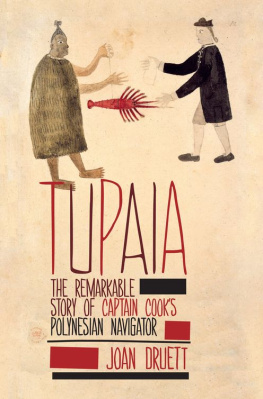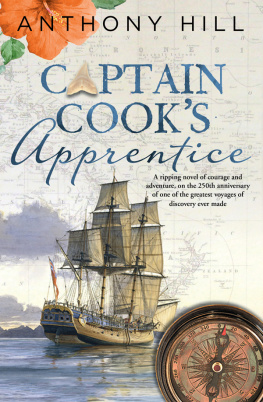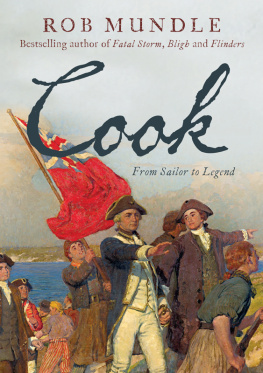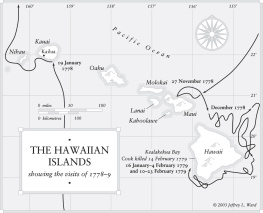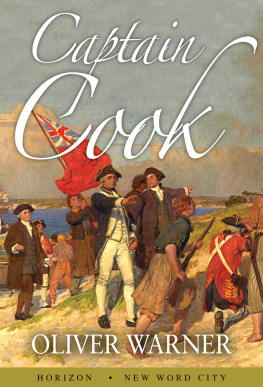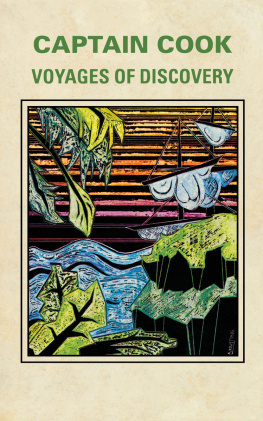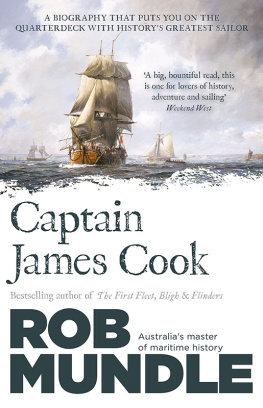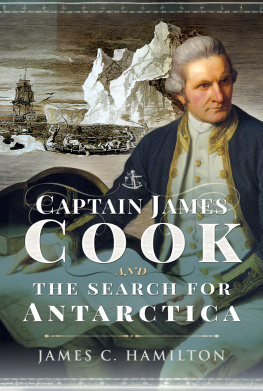FARTHER THAN ANY MAN
Also by Martin Dugard
Surviving the Toughest Race on Earth
Knockdown: The Harrowing True Account of a Yacht Race Turned Deadly
FARTHER THAN ANY MAN
The Rise and Fall of
CAPTAIN JAMES COOK
Martin Dugard

 | POCKET BOOKS, a division of Simon & Schuster, Inc.
1230 Avenue of the Americas, New York, NY 10020
www.SimonandSchuster.com |
Visit us on the World Wide Web:
http://www.SimonSays.com
Copyright 2001 by Martin Dugard
All rights reserved, including the right to reproduce this book or portions thereof in any form whatsoever. For information address Pocket Books, 1230 Avenue of the Americas, New York, NY 10020
ISBN 0-7434-3639-3
eISBN-13: 978-0-7434-3639-7
POCKET and colophon are registered trademarks of
Simon & Schuster, Inc.
For Devin, Connor, and Liam
You call it luck. I call it destiny.
Adventurer Daniel Dravot, in Rudyard
Kiplings The Man Who Would Be King,
on becoming a god
ACKNOWLEDGMENTS
The special genius of Jason Kaufman made this book possible.
Thanks also to Phil Kennington, Graem Sims, Harry Lumb, Steve Madden, Mary and John Harney, Mark Burnett, Jeff Probst, Craig Piligian, Scott Waxman, Gordon Wright, Austin Murphy, and Dean Austin Lewis.
Farewell to Monique Dugard Lewis and Marc Dugardyou did not go gently.
Love to Calene, Devin, Connor, and Liam.
CONTENTS
PROLOGUE
Newport, Rhode Island
Ive come here, to this natural harbor fronting New Englands intracoastal waterway, to begin my search for the real James Cook. I want to clear away the tangle of myth and hero worship that has elevated this relentless, passionate loner into the realm of historic sainthood. My goal is to better understand him and the motivations that led him to wander away from home and safety for years at a time. It was a wandering that became an addiction, then a bewilderment, and ultimately, a death sentence.
In learning about Cook I hope to learn more about myself, for I am slowly becoming addicted to adventurous wandering, too. The drive is enigmatic, contradictory to my deep love for my wife and three young children, and has made me fixate on a hard question: Why do people who are otherwise deeply content feel the need to risk allfamily, career, and even lifeto pursue adventure?
The question predates Cook, but feels fresh in an era when the societal craving to scale sheer rock faces, sail the globe, or merely cling to an inflatable raft as it bucks through Class V white water has rendered adventure almost status quo. There is nothing, however, status quo about the horrific consequences of that moment the rope breaks, a rogue wave hits at midnight, or the raft flips, and whatever illusion of immortality the adventurer had clung to for reassurance is exposed as myth. Death is part and parcel of adventure.
The questions easy answer is that adventurers have death wishes; were all aching to go out in the twenty-first centurys version of dying with our boots on. But I know thats not the case. Adventures great irony is that adventurers hold life in higher esteem than the general populace. By pushing limits and confronting fears, life becomes sweeter, more easily savored moment by moment. The other answer, of course, is an addiction to adrenaline. But any adventurer will tell you thats false, because the only time adrenaline enters into the picture is when things go very wrong. Only the foolhardy get hooked on adrenaline.
I suspect the answer lies with James Cook, the original adventurer. Prior to Cook, the term adventure was synonymous with gambling. The Latin origin of the word is advenire, meaning about to happen. A gambler would yell Adventure! for help at the roulette wheel, much the same way a modern gambler might cry Come on, seven! Gambling was rife in all levels of English society, but to be an adventurer was to be of the lowest caste a man without responsibility or care, abiding by the rules of a parallel society. Quite often adventurer was hurled as an insult.
Then Jonathan Swift wrote Gullivers Travels. Swift spun adventure on its head, using the word to imply bravery and edge-of-the-envelope daring. The book was a smash, and adventures new meaning filtered into the publics collective frontal lobe. Men of distinction and daring became glad to hear their names associated with adventure. But it was Cook, sailing the globe forty years after Gullivers publication, who became synonymous with the word. He imbued it with courage and class.
Adventure wasnt just risk-taking to Cook, but a form of labor that bordered on art. He carried out work that was so all-encompassing, the great French explorer La Prouse noted of Cooks daring, that there was little for his successors to do but admire it.
Over the past two centuries, however, Cook has faded to a historical line drawing. Australians beatify the man (perhaps because Cook is the primaryreason they dont speak French), native cultures vilify him, corporations longing to sound worldly take his name. Admirers ignore his shortcomings and paint him as a humble saint. Those with a vague awareness of Cook sum him up as a cartoon figurea musty, fusty British sailor in a white-powdered wig, spyglass in hand, thundering orders with the gravitas of Charles Laughton. But few identify him with hard-core adventure.
Adding to the confusion is the alliterative way Cooks name and rank trip off the tongue like a trademarkCoca-Cola, Kentucky Fried Chicken, Captain Cook. That catchy collection of consonants has trivialized the man, but is also a major reason Cook has not disappeared from the public consciousness as have more phonetically challengingly named explorers such as Abel Tasman or Pedro Fernandes de Queirs. Captain Cook became Sir James Matthew Barries Captain Hook of Peter Pan in 1904 and Gene Roddenberrys Captain Kirk of Star Trek in 1966. Cooks ambition to go as far as I think it possible for man to go even became the starship Enterprises mission to boldly go where no man has gone before.
Its worth noting that the alliteration is misleading. In his fifty years on earth, Cook held the rank of captain just four years. The rank does not define the man.
A more thorough insight comes from the personality-typing theories Carl Jung would set forth a century and a half after Cooks death. Based on actions, relationships, and written words, Jung would label people like Cook an INTJ (Introvert, Intuitive, Thinker, Judger). The INTJs mental strength makes them exceptionally independent. They are passionate and warmhearted but, because of their introversion, can come across as aloof. They have a critical mind that questions everything. They disdain authority if it seems illogical. They daydream constantly, and their drive to transfer those dreams into reality can even come across as eccentric to those who dont share the vision.
Cook, then, was quirky, bold, caring, and proudand had a vision of the world that is only now being realized. It was Cook who began knitting earths cultures one island at a time. Two centuries after Cook, the Internet finished the task, creating a global village. Its sweet irony that Tuvalu, the


